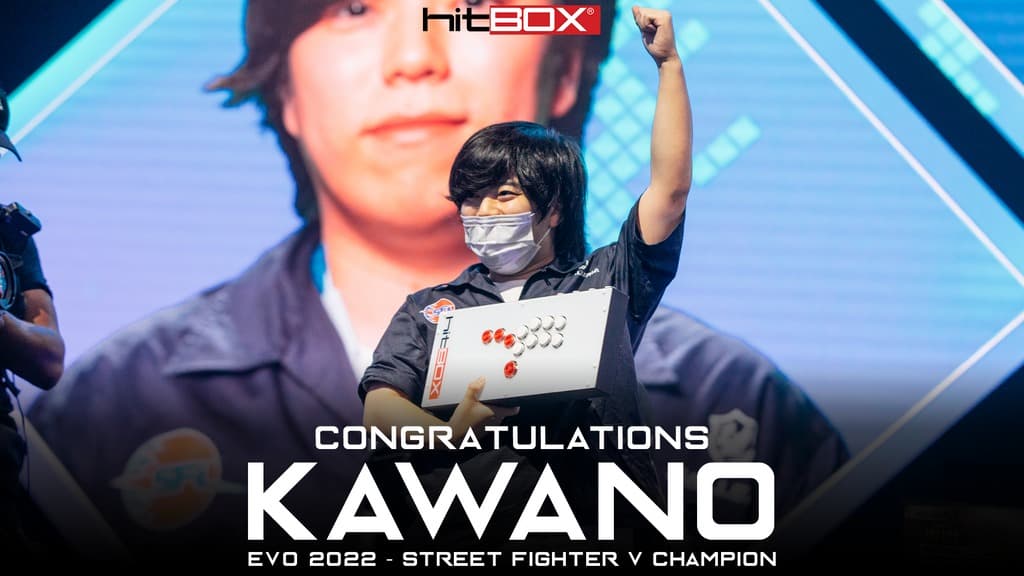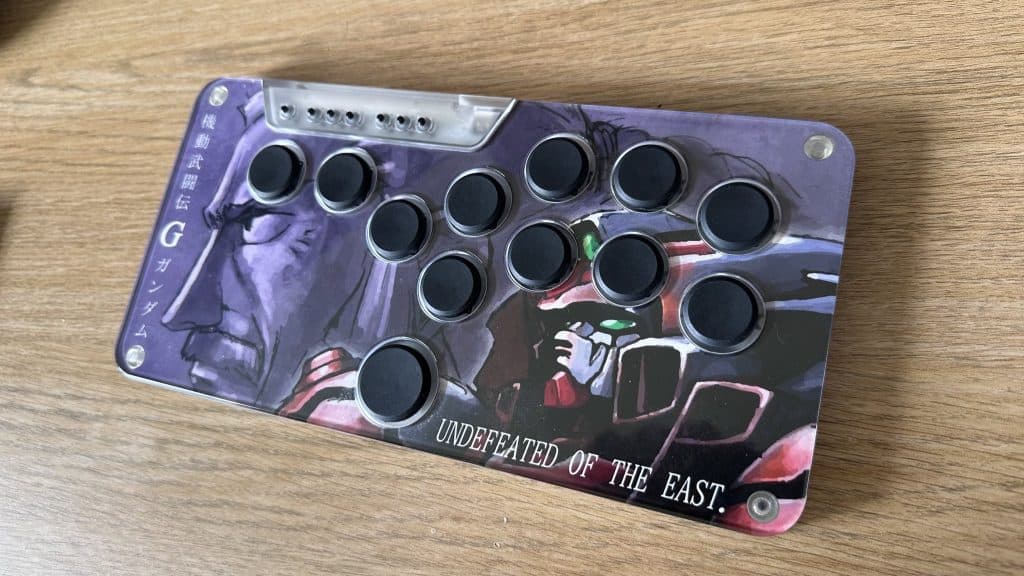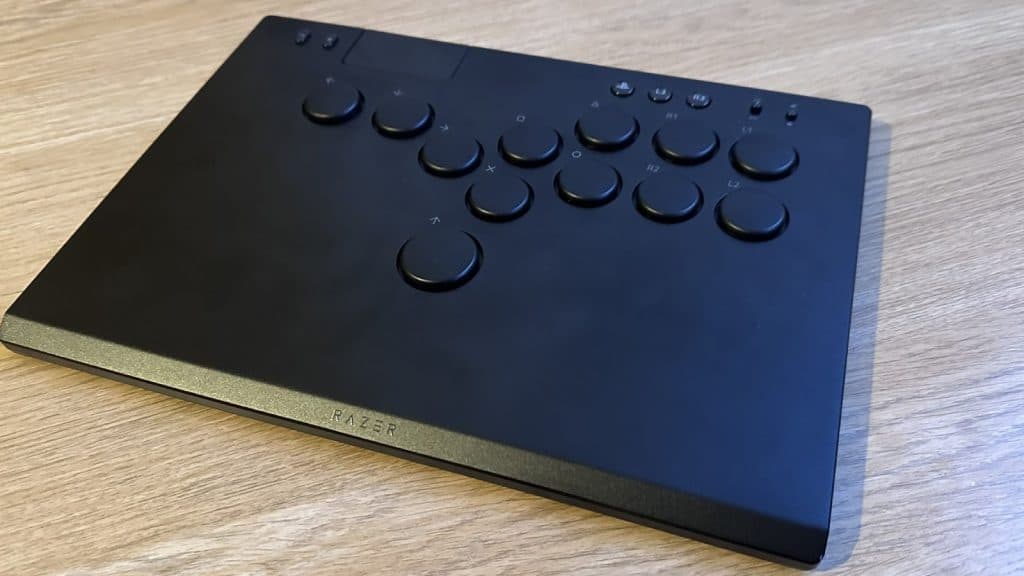These controversial controllers are taking the FGC by storm – here’s why
 Capcom / Haute 42
Capcom / Haute 42Look to any fighting game local, tournament, or online community, and you’ll find one type of controller sweeping the scene off its feet: “Leverless” button boxes. But, there’s more than meets the eye to these controllers regarding their cost, production, and patents.
A couple of weeks ago, I went to my local fighting game meetup: A tradition in the FGC, where you test your mettle against other strong players in your local scene. Back in 2016, when Street Fighter V launched, everyone brought along their big arcade stick of choice. Yet, when I finally visited my new local in 2024, things looked very different.
Leverless controllers were everywhere. These button boxes eliminate the traditional arcade lever and replace them with buttons. Street Fighter Pro Daigo Umehara debuted an ambitious customized leverless controller with 16 buttons at Combo Breaker 2019, which was promptly banned from use in the tournament.
The leverless controversy
This caused some controversy in the FGC at the time, with many decrying the controller for enabling the possibility of entering simultaneous opposing cardinal directions (or SOCD), as the controller had additional left and right inputs, as well as additional punch and kick buttons.
This, therefore, enables input shortcuts to make performing special moves easier. The controller was designed by Gafro, who posted an example of a similar stick on their X page in 2018.
Leverless controllers also have a SOCD cleaner, which resets the opposing cardinal directions to bring them into a position that can be customized. Daigo’s version of the SOCD cleaner was alleged to offer him a competitive advantage, using an obscure SOCD cleaning method. This has led to community debates on whether or not using a leverless controller is considered “cheating”.
Members of the /r/Fightsticks subreddit have had countless debates on leverless controllers. User Str33tMoV commented in a thread: “It’s much easier to perform [special moves] in nearly every fighting game with a hitbox,” while ‘Mail_the_skeleton’ said: “It was only cheating when you could hold left and right or up and down at the same time, a ds4 controller can be abused to do the same tech.”
User Esamgrady chimed into the debate, saying: “All button controllers aren’t cheating. The problem is that hardware SOCD allows for some developer unintended input shortcuts that can’t be patched out. This could easily be fixed by mandating a specific SOCD filter in sticks at tournaments that can’t be modified by the builder of the stick.”
Ahead of Street Fighter 6’s launch, Capcom’s Pro Tour rules specified their own SOCD rules. When holding up and down, it equals a neutral input, which is the same if you were to hold left and right at the same time. This has led to the development of officially licensed leverless controllers, like the Razer Kitsune.
Traditionally, specialized fighting game controllers (aside from pads) with or without a lever have been expensive. Victrix’s Pro FS arcade stick can cost you up to $349, and Razer’s leverless Kitsune will set you back a cool $299. But, the leverless form factor also opens doors for smaller brands, like Junk Food Arcades, to create alternatives.
Rise of the stickless controller
One brand coming out of China, Haute 42, aims to break down barriers for players looking to get a leverless controller. Their cheapest devices come in at around $50, a huge gulf in price compared to premium options.
Take a peek into the /r/fightsticks subreddit, and you’ll likely come across a Haute 42 controller, replete with customization thanks to its friendly design and open-source roots in the form of their Raspberry Pi-based chips.
I’ve been using their newest $110 M16 Plus controller for just over a month, and the differences between that and the $300 Razer Kitsune are relatively minor, outside of some headaches with console compatibility and picking up Brook Converters, which come with downsides, these smaller brands often offer better value for money.
With cheaper models from Haute 42 promoting customization with space for artwork, alongside links in their Discord channel on where to find and purchase additional accessories, it all feels gleefully community-centric.
Back in the days of the Shoryuken forums in the Street Fighter IV era, you used to see similar levels of support from the community when making traditional arcade sticks.
That spirit is still alive today, thanks to brands like Haute 42 and the people behind the OpenStickCommunity, who are looking to democratize the leverless controller’s design. So, over the past several years, the popularity of leverless controllers has skyrocketed.
However, Hit Box, the brand responsible for patenting and popularizing the layout, also revealed a controversial licensing program that sent the community into a furor.
The FGC in frenzy
When talking about leverless controllers, you might hear some refer to them as “Hit Boxes”. This originates from a brand that patented and popularized the leverless design for over a decade.
On April 11, 2024, Hit Box announced a licensing program wherein brands can apply to be licensees of their leverless layout patents. An excerpt from Hit Box’s licensing page reads:
“Licensing provides our company with the ability to share our IP without the worry of other companies damaging it. Through the licensing program, we can officially endorse and collaborate with other high-quality companies and manufacturers.”
 Hit Box / Li Hoang
Hit Box / Li HoangBut, the response to the announcement wasn’t kind. In an /r/fightsticks Reddit thread, members of the FGC made their thoughts heard loud and clear.
Commenter Rayquan36 said: “Man how ironic is it that Hitbox wants companies to license this while they use hacked unlicensed PCBs to get their stuff working on PS3/PS4 and refuse to license PS5 compatibility.”
Another exclaimed, ”Arcade sticks been around for decades and nobody tried to pull off this level of scummy bullsh*t.” Another comment stated: “Way to lose any respect I still had for your brand.”
Content creator Bob Wulff said in a post on X/Twitter: “Leverless fightsticks/pad design should be free and open to use. It’s way too simple an idea. Literally a box with buttons. This ‘licensing program’ only exists to bully smaller companies. Go after Razer for the Kitsune if you’re so tough.”
Hit Box responds
Hit Box has been embroiled in a legal battle with controller manufacturer Junk Food Arcades since December 2021. Neither Hit Box nor Junk Food Arcades responded to our requests for comment on the legal action between them.
However, in a statement sent to Dexerto regarding their licensing program, a Hit Box representative said: “Our licensing program is completely voluntary, and therefore, we will not be requiring all makers of leverless sticks to participate if they have no interest in doing so.”
Razer refused our request for comment when asked if the Kitsune controller potentially infringes upon the patent, held by Hit Box. But, when we asked Hit Box whether they would seek licensing from bigger brands, they had this to say:
“As we do possess a patent issued and recognized by the USPTO, it would be within our right to enforce instances of patent infringement where it makes sense to do so.”
To get further insight into the current case with Junk Food Arcades, we spoke with fighting game expert and commentator David Graham, also known as UltraDavid, who also acts as General Counsel for esports organization Ten/O.
 Dexerto
Dexerto He told Dexerto: “If the case ends up with Hit Box’s patent being validated, then Hit Box can [take legal action] against anyone else, too, until the patent expires. If instead the case ends up with their patent invalidated, then of course they can’t.”
Graham further commented: “…what they’ve talked about licensing isn’t just their patent rights, but also their name and reputation by blessing other people’s products as approved by them.”
UltraDavid continued that it’s possible Hit Box could aim to be more active in their patent rights by announcing the licensing program, or to “convince the judge that their rights are looked on favorably in the industry.”
The future of leverless controllers
While Hit Box’s licensing program and ongoing legal battle with Junk Food Arcades remain unresolved, more leverless controllers are hitting the market every day. With Hit Box clarifying that their licensing program is voluntary, it seems that there’s no stopping manufacturers from utilizing the layout.
But the nomenclature of being named a “Hit Box” controller could invoke the ire of the company, whose licensing program seemingly extends to simply being a way to badge a controller as high-quality, with a literal Hit Box seal of approval.
 Dexerto
Dexerto Elsewhere, Varmillo is teasing a leverless controller that has rapid trigger features, commonly seen in gaming keyboards like the Wooting 60HE, while fighting game player Tokido has revealed the OneFrame, a button that relies on microswitches instead of traditional arcade buttons or mechanical keys.
Innovation in the fighting game peripheral space will inevitably continue, thanks to the grassroots DIY nature of the FGC and collectives like OpenStickCommunity.
UltraDavid concluded: “In any case, I hope [Hit Box] don’t try shutting down other community businesses and limiting the innovation and spread of useful tech/products, I think both of those would be real bummers.”